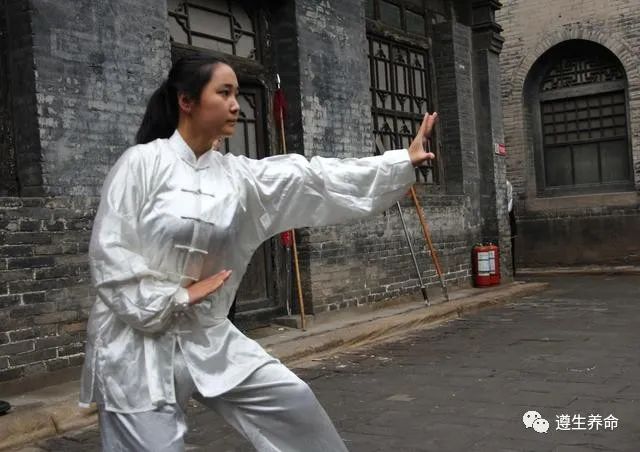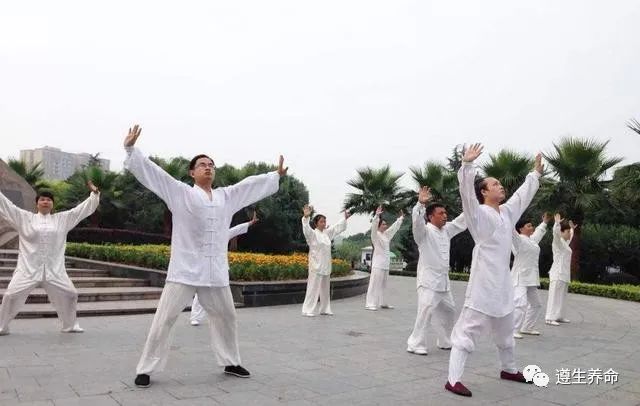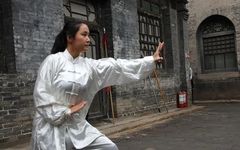“There is no deviation in practicing Qigong” is a saying for those who have entered the realm of Qigong. Beginners often experience deviations due to improper postures and intentions, leading to discomfort and fear of Qigong, causing them to abandon their practice and leave them lamenting their inability to continue.

Here, I would like to share some common symptoms of deviation and methods for correction.
1. Qi Accumulation at the Crown (Qi Ju Tou Ding): This is caused by excessive focus, tension, or eagerness for quick results. Symptoms include a feeling of heaviness on the head, as if a stone is pressing down, making it difficult to lift the head, and using Qi to guide it downwards is also ineffective. This situation often occurs in individuals who are serious, impatient, and rigid in their practice.
Correction Method: ① Self-Correction: Relax the whole body, slightly close the eyes, and press the tongue against the palate. Inhale deeply, directing the Qi to the top of the head while performing the above actions simultaneously, then suddenly open the eyes (note: just open the eyes, do not widen or glare), while simultaneously lowering the tongue and exhaling, focusing inward on the lower Dantian, allowing the Qi to sink into the lower Dantian (note that the Qi should sink like a heavy object, not be forced down; otherwise, it will float back up like ice in water). Repeat this several times.

② Assisting Others in Correction: Bring the five fingers together, palms inward, forming a hollow shape, and gently pat the patient’s head while making a sound. Be careful not to use a solid palm to strike the Baihui (百会) point to avoid issues. After patting for a while, use the side of the palm to chop at the back of the neck near the Yuzhen (玉枕) point, which will produce a sound from the teeth in front. After chopping, saliva will increase; do not spit it out, but swallow it. Finally, massage and knead the sides of the neck a few times, then pat the shoulders a few times to help the Qi descend, allowing the patient to feel a sudden release as if a heavy object has been removed from the top of their head.
2. Qi Accumulation at the Eyebrow Center (Qi Ju Mei Xin): This is caused by excessive focus on the upper Dantian. Symptoms include Qi stagnation at the upper Dantian, a feeling of swelling at the eyebrow center, difficulty in keeping the eyes open or closed, and a dull headache that feels like it might explode, causing discomfort.
The correction method is to find a Qigong master to guide the Qi downwards along the Ren Meridian (任脉) using a pointing finger. Alternatively, one can focus on the lower Dantian or distract oneself with increased physical activity to correct the issue.

3. Qi Accumulation at the Middle Dantian (Qi Ju Dan Zhong): Symptoms include Qi stagnation at the middle Dantian, leading to discomfort when sitting, with a feeling of something blocking the chest and a sense of pressure. This is often due to improper breathing techniques during practice, blindly pursuing deep, even, fine, and prolonged breathing, or due to tight clothing affecting the movement of the chest and abdomen during breathing, causing Qi stagnation in the chest.
Correction Method: Before practicing, loosen clothing, stand naturally with feet apart, place the left hand inside and the right hand outside, overlapping on the chest at the middle Dantian point, and perform clockwise circular massages, then switch to the right hand inside and the left hand outside for counterclockwise circular massages, each for eighty-one times. Another method is to have someone use a pointing finger, directing the Qi downwards, allowing the patient to visualize the Qi sinking from the middle Dantian to the lower Dantian.
4. Shock During Practice (Lian Gong Shou Jing): Experiencing a sudden shock during practice can lead to a feeling of Qi dispersing, weakness throughout the body, and palpitations. In such cases, one should slightly close the eyes, lightly close the teeth, slightly part the lips, press the tongue against the palate, inhale deeply while making a hissing sound, and draw the Qi into the abdomen. The sound should be short and urgent, allowing the scattered Qi to gather again, and the Qi that has not returned can also be directed back to the Dantian. The number of repetitions should be based on the feeling of Qi returning to the Dantian.

Additionally, after being startled, one can place both hands with fingers facing each other at the back of the neck, pressing the ear flaps forward, and use the middle and index fingers to tap the Fengfu (风府) point, performing the “Ming Tian Gu” (鸣天鼓) technique ten times; or after being startled, do not stop practicing, keep the eyes closed, do not move the head, and slowly look to the left until reaching the limit, then return to the front, repeating this four times, and then look to the right in the same manner, which will help restore a state of calm.
The above methods are for your reference. To minimize deviations during practice, it is generally advisable to practice under the guidance of experienced individuals, progressing gradually without rushing for results. The goal should be health and wellness, rather than blindly pursuing special abilities; let it happen naturally, and the results will come.
Moreover, practitioners should choose their methods based on their personality and temperament. Those who are impatient, lively, and quick to react should focus on martial arts Qigong or dynamic practices; those who are patient, slow to react, and stable should focus on nourishing Qigong or static practices.

Choosing the right method for oneself is equivalent to finding a shortcut to practice, which will reduce deviations and allow one’s abilities to reach a higher level in a short time, thus avoiding the situation of “Qigong is a treasure, but I cannot practice it.” (Wang Wendian)
Recommended Reading——Are Physical Ailments Often Expressions of Emotional Trauma? Use Your Subconscious to Help You Find Trauma Pressure Points

